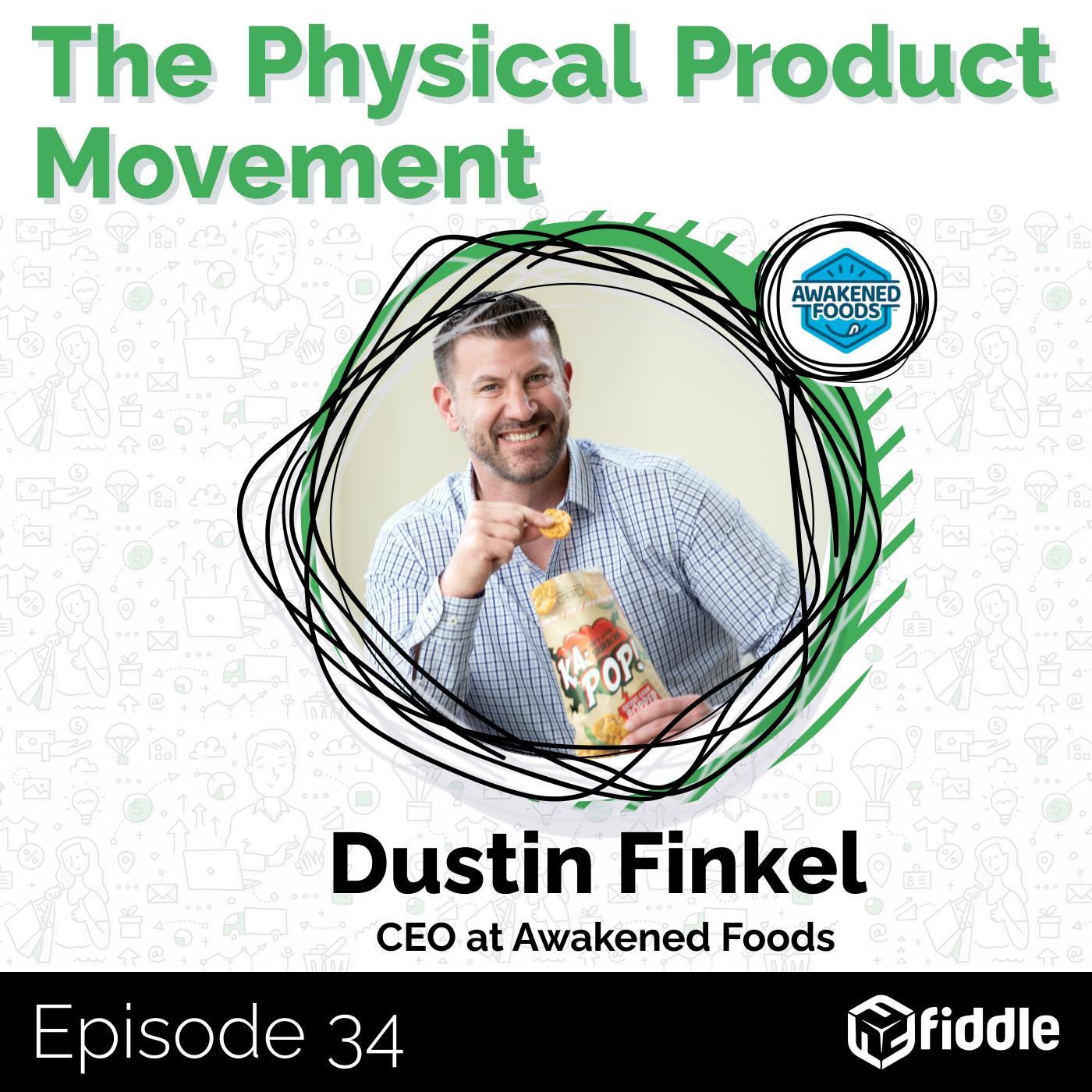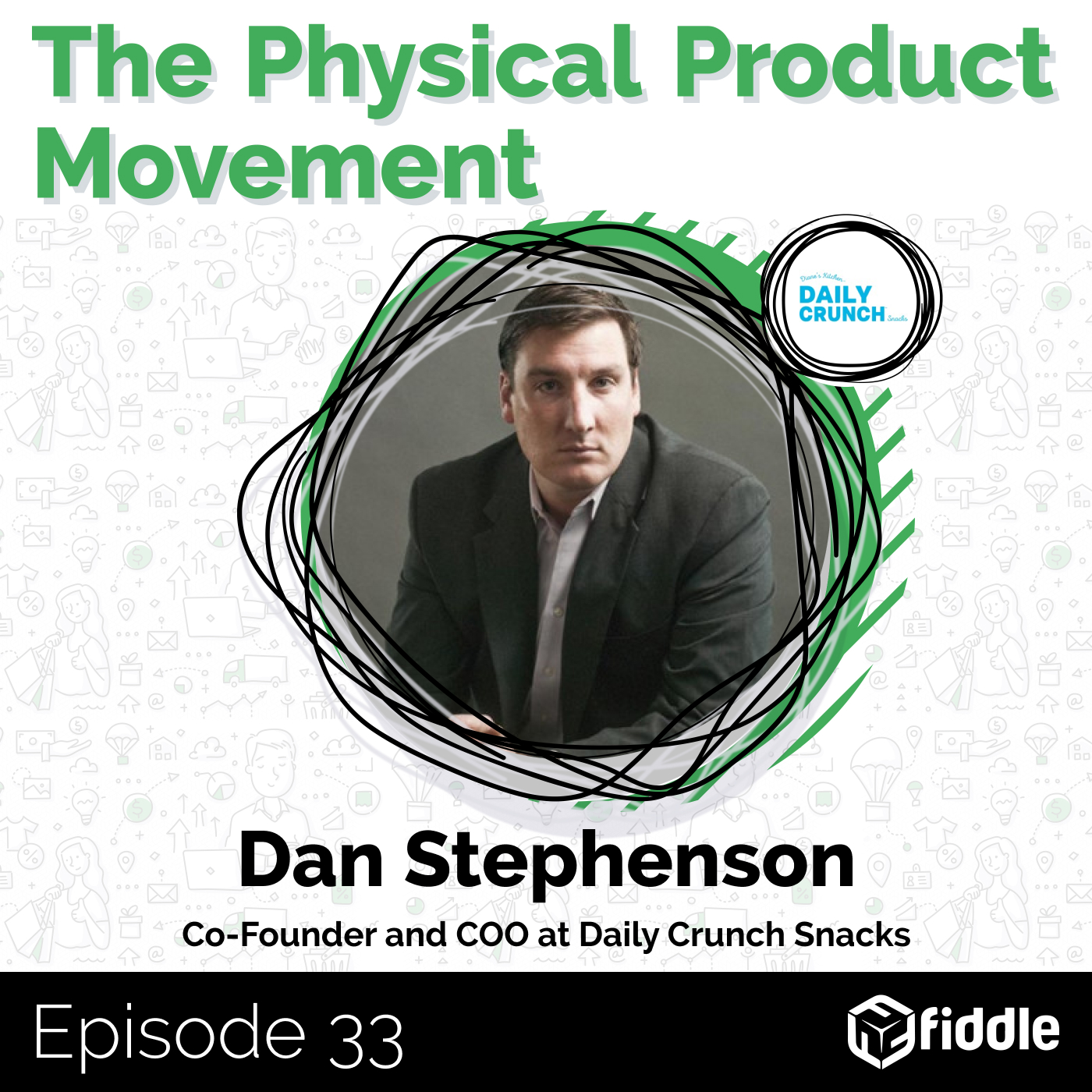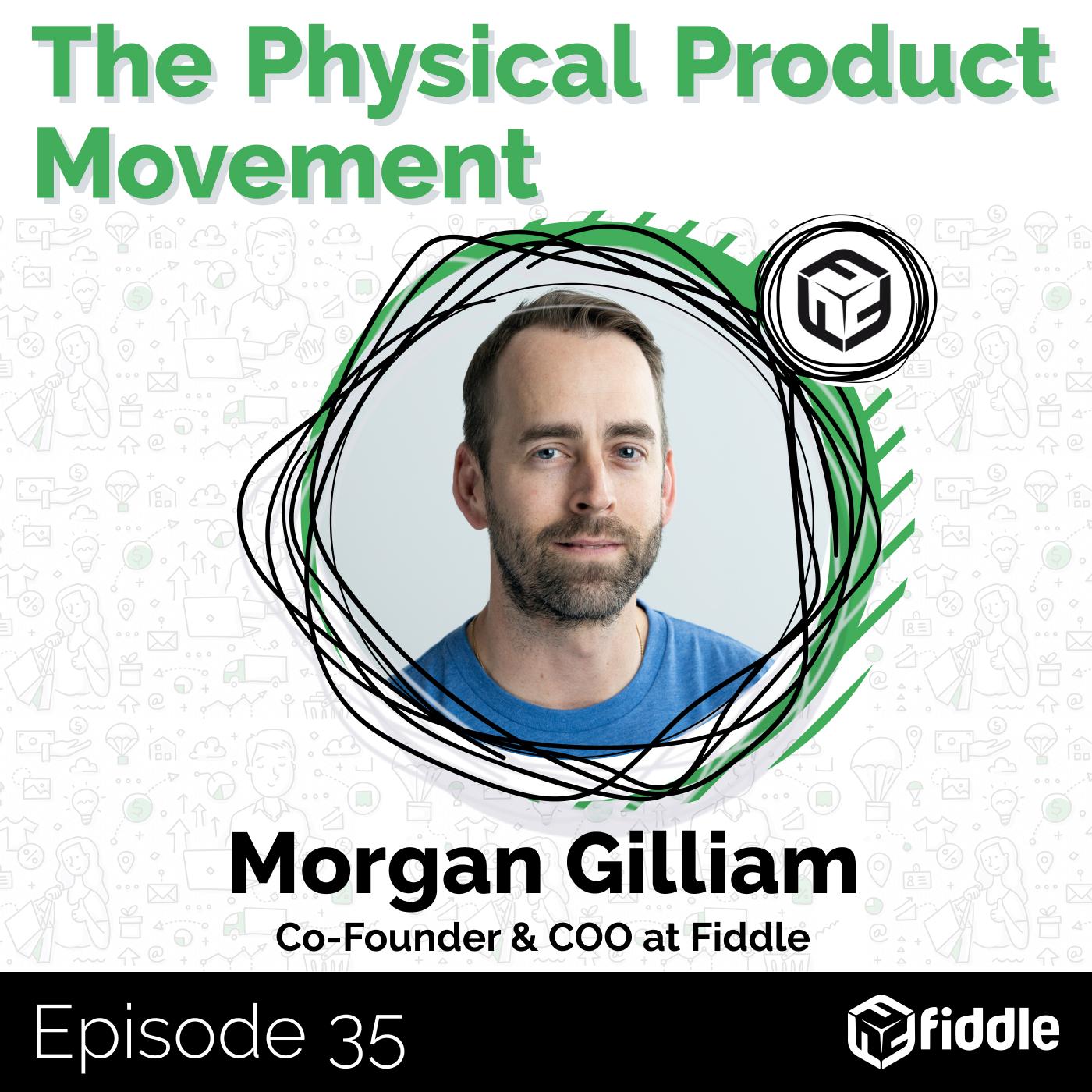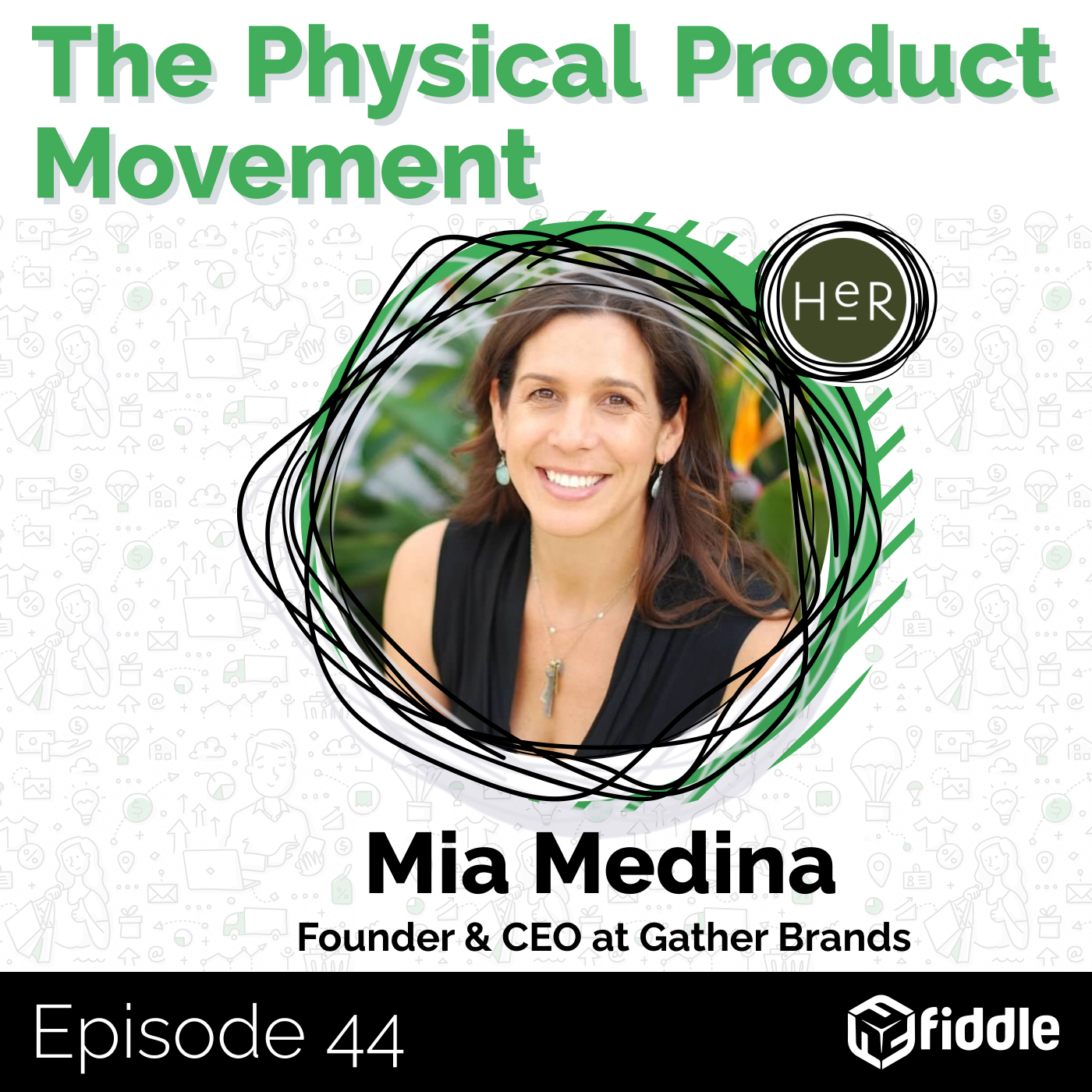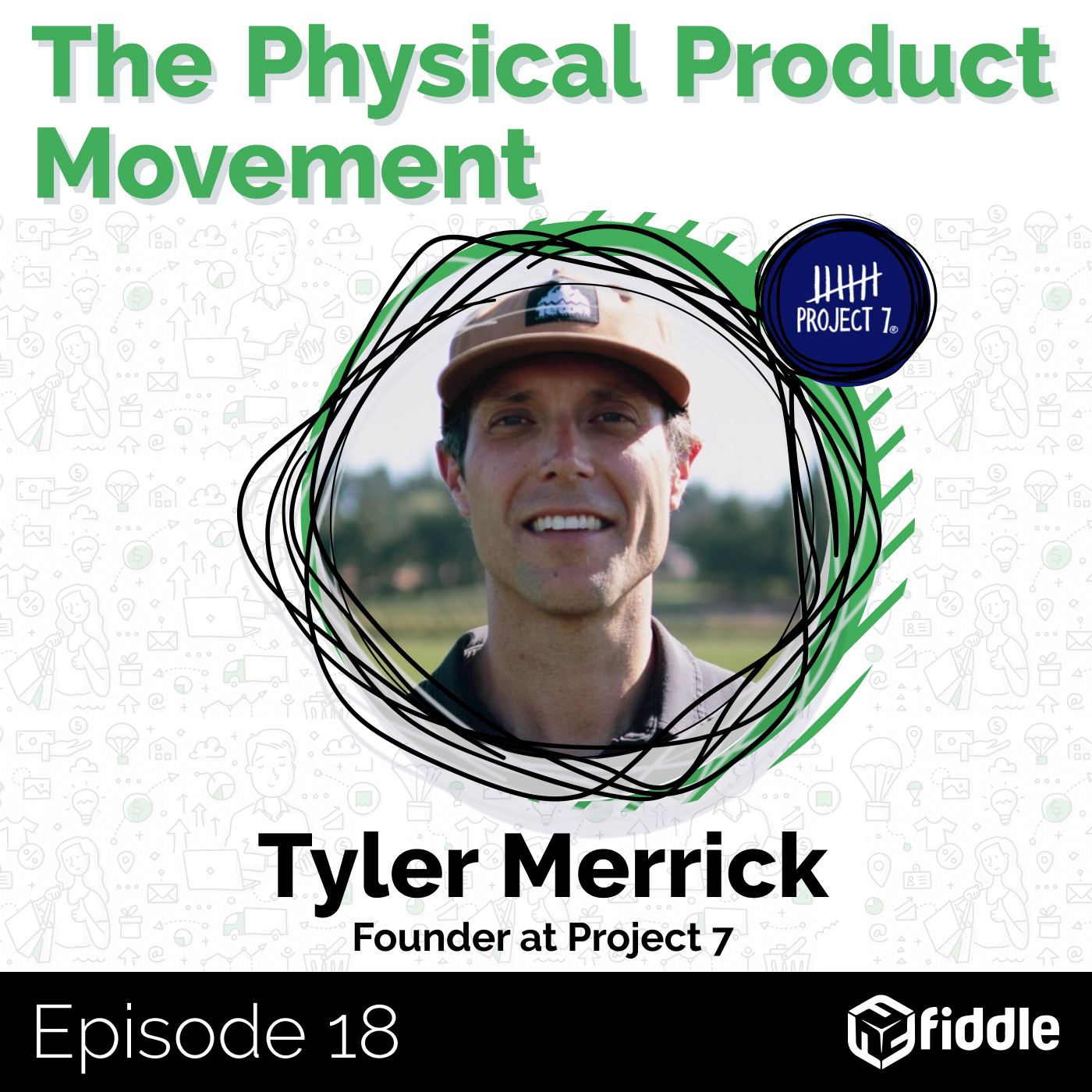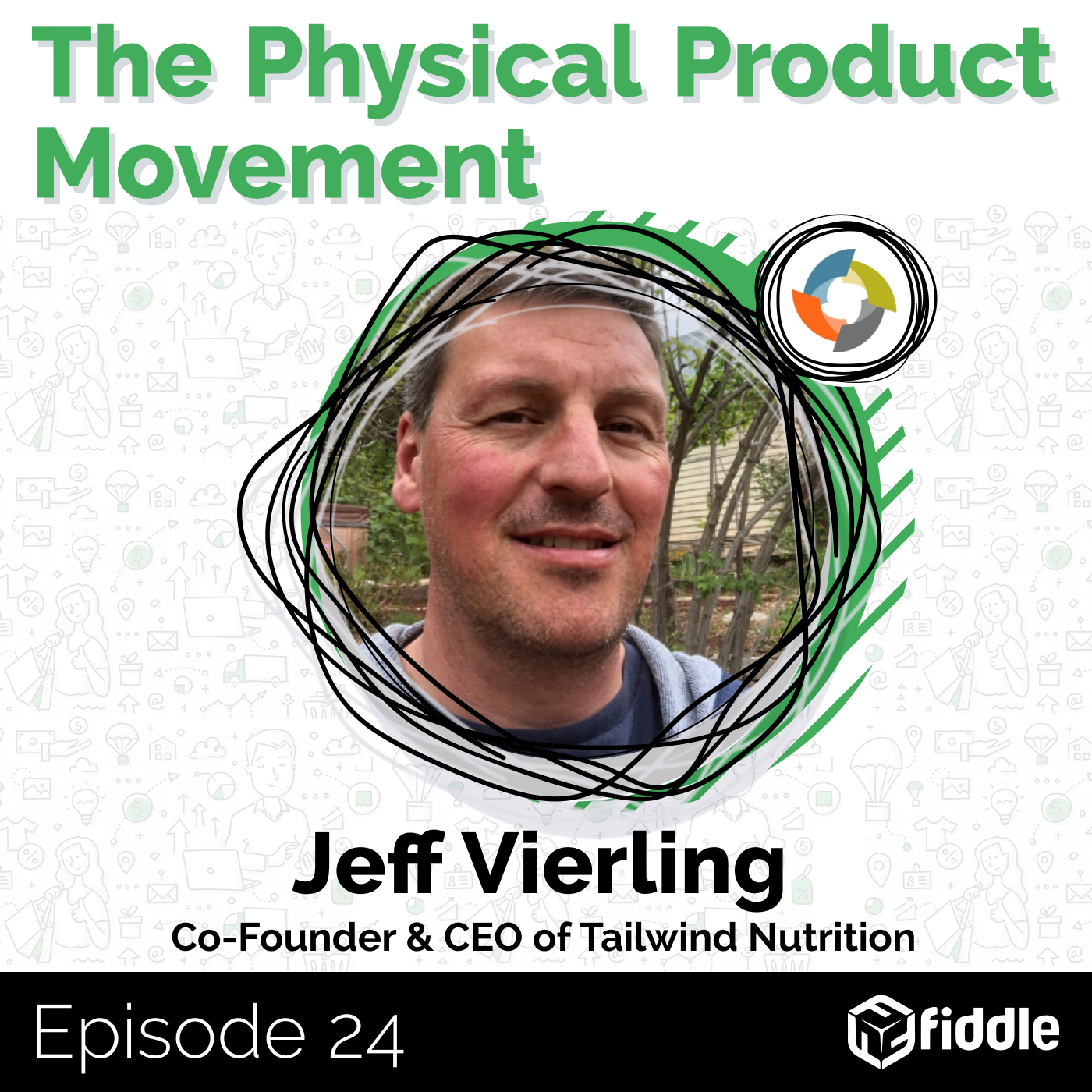In this episode, which is guest hosted by Andy Burningham, Sales Director at Fiddle, we’re joined by Dustin Finkel, CEO of Awakened Foods.
Awakened Foods is a well-established private labeling and co-manufacturing company that works with some very well-known clients in the CPG industry.
Dustin shared some transparent and actionable insights that will be of great help for those raising capital to scale their brands and some invaluable tips on how to partner with co-manufacturers.
Listen on Apple Podcasts here or Spotify here.
Transcript
Ken Ojuka: Welcome to the Physical Product Movement, a podcast by Fiddle, we share stories of the world’s most ambitious and exciting physical product brands to help you capitalize on the monumental change in how, why and where consumers buy. I’m your host, Ken Ojuka.
Andy Burningham: Hello everyone. And welcome. My name is Andy Burningham and I am with Fiddle Inventory Management Software, and I’m excited to have a special guest with us today. We are going to put him on the hot seat and ask him three questions for any CPG brand or any contract manufacturer out there. From his experience that he can share with you and help you in your business to be more successful.
Andy Burningham: And I’d like to welcome my special guests, Dustin Finkel. Dustin, how are you, man?
Dustin Finkel: I appreciate it, Andy. I like being on the hot seat, although I am standing to be fair, I gotta get that energy going and then, I like being special, so it’s worked out, but I’m excited to be here and I think I’m one of them.
Dustin Finkel: Great things that you’re doing is trying to provide some valuable information to smaller brands as they’re looking at co manufacturing and other things. So I’m, hopefully it will be a bit of help to these guys. Yeah,
Andy Burningham: absolutely. And I’m sure we will. I know Dustin, you and I have had a little bit of a history in the past, but I’ve just from what I’ve heard from your experiences, and everything you’ve gone through to now be the CEO at Awakened Foods, a contract manufacturer, is amazing.
Andy Burningham: It’s an amazing story from where you’ve come from. Yeah, starting at Shark Tank working your way up. And now here you are today. So before we jump into the three burning questions that I have for you, Dustin, can you tell us a little bit about Awakened Foods?
Dustin Finkel: I appreciate it. So for those of you watching the video, you can see Awakened Foods has Kapok as one of its brands.
Dustin Finkel: Bubba’s fine foods and Awakened Food Crafters. And so, what Awakened Foods is a combination of two amazing brands that, in our opinion, has every major food trend out there, whether you’re grain-free or paleo or keto or ancient grain, or whole grain. We literally hit everything. And as I always like to say, we’re vegan.
Dustin Finkel: non-GMO top 12 allergen-free, but not taste free. And so we love to focus on taste because we believe that people should be able to eat clean, authentic food, but do it in an indulgent and delicious way. But the actor that’s a bit unique about us is we added a manufacturing operation. We call weekend food crafters, and not only do we manufacture our own products, we manufacture for retailers.
Dustin Finkel: And other brands as well. And what’s interesting about those other brands is that some are actually in direct competition with myself as a brand, but I do a really nice job. I think of wearing different hats. The one thing I’ll say is the differentiation for the brands, as I mentioned, is that great taste, which should not be a differentiator.
Dustin Finkel: But I tell all of our potential clients the same thing about weekend food crafters. Our differentiators should not be the differentiator it is, but we’re a partner. I don’t think of your product coming through my machines and spitting out as many puffs or chips or whatever as possible. I think about you as a brand, I’ve been in this industry for about 20 years.
Dustin Finkel: Now, seeing all the good, the bad and the ugly, which is unfortunately part of the case with the manufacturing world. And we want to make sure that we’re here as a support engine to you, whether you need advice on marketing, on branding, on manufacturing, we’re here as a partner cause the old saying goes, Hey, guess what?
Dustin Finkel: If you sell more, I manufacture more. We both make more money. I think that’s how business should work. Right,
Andy Burningham: Right. Common sense there. I’ll tell you I’ve met a lot of people on your staff. It’s a great group of people. I have loved working with your company in the past. And I know that Awakened Foods, I could definitely endorse you guys.
Andy Burningham: You guys are a great company, so well, let’s jump into it again and get three burning questions, putting you on the hot seat here. The standing hot seat. So the first question, let’s go back. I alluded to shark tank, you were on shark tank, and I know a lot of people that might be watching this video are a young brand, a young company.
Andy Burningham: And what they need to do is they need a hustle and they’re looking at raising capital from investors. So based on your experience, what advice would you give them as they’re doing different rounds of fundraising?
Dustin Finkel: I have this conversation quite a bit. And I think it’s important to note that I come from an investment banking background.
Dustin Finkel: So finance is a core asset to me from an education and career perspective. But I also think it’s the biggest gap that I find in companies that I am mentoring. I sit on the board of, or that I’m counseling. For private equity companies there’s a lack of financial wherewithal in these companies.
Dustin Finkel: So how did you come up with that forecast? Where did those numbers come from? What’s driving your sales. What are the risks to your sales? What do you think about the growth? And it’s shocking when you see some of the models of these companies and it’s very rudimentary straight-line or hockey stick growth.
Dustin Finkel: Typically there’s not a number on my P and L cash flow statement or balance sheet that probably I’m too far off the radar, but it does not have three or four separate pages that dictate every single assumption and how every single idea that we’re driving into our P and L comes from, and I genuinely run my company with a P and L and cash flow mindset.
Dustin Finkel: Okay. Ultimately this small company, that’s all that matters that PNL tells a story, right? Go down to the P and L the first line item is sales. There’s a lot of stories in sales, right? The next line is trade. What do you think about discounting those sales, the next line, and I’m kind of being a big bucket, but the next line is COGS Cost of Goods Sold.
Dustin Finkel: Think about all the impacts to your cost of goods sold and the impact that has to your margin, your gross margin, and there’s gross margin versus net margin, then marketing and distribution and ops and so on and so forth. But the point is, every line tells a story and can really dictate the success and health of the company.
Dustin Finkel: On the cash flow statement, you don’t need a super robust cash flow statement. You don’t need all the lines, frankly. I literally use cash in cash out. Okay. Okay. Let’s see. Do I have enough cash to operate a business? And there’s other things that are more important, but it has a small company. You don’t have time to analyze net asset returns and all these other crazy factors.
Dustin Finkel: Right. Keep it simple. Long story short. I think the lack of financial understanding is a big hindrance. I’ve had a lot of success fundraising. I still hear more nos than yeses, but we’d had a lot of success because I think people really trust my numbers. They know I’m wrong. Because my forecast is a hundred percent wrong.
Dustin Finkel: So is everyone’s forecast, but they know the assumptions and the way I derived those numbers come with a lot of due diligence and a lot of analysis.
Andy Burningham: Yeah, good. No, that’s very good. So would you say that it’s important for somebody to like, if they don’t know their financials very well, that they get somebody that can help them nail those financials for the round of investing to get.
Dustin Finkel: Answer is probably simply as, yes, I would argue as a CEO of a company, you need to understand your numbers. You may not need to be able to do the modeling I can do. And the crazy fun Excel tricks that I get geek out on and things like that. Right. I will tell you if you don’t know your numbers, you should know your numbers as well as anybody in the company.
Dustin Finkel: And now I’m not talking the three levels down. We used to really understand the key drivers, those buckets I just talked about, right? Sales, cogs, distribution, things like that. You should understand what’s driving that because at the stages. Of companies like mine and others. Those are the deal-breakers for a company.
Dustin Finkel: And again, it tells a story. And so yes, you, if you’re not a model and you need support there, there’s plenty of outsource CFO groups or accounting groups absolutely use those, but you better understand those numbers because if you’re on stage, whether it’s one-on-one with an investor or in front of shark tank, You know, you need to know that.
Dustin Finkel: And if you watch my shark tank episode, I got a lot of credit for really knowing my business. And I think that really differentiated maybe, cause I could talk, you can ask me any question about my business and I know the answer and that holds true today and I’m not going on shark tank tomorrow, as far as I know.
Andy Burningham: No, that sounds great. No, that’s great advice. No, thank you for that. Question number two, I want to ask. So when brands are scaling and they’re looking for a contract manufacturer like you, what are some critical items? Because a lot of these brands, they’re young, they might feel like they’re being slighted by a big player.
in green, gained some traction.
Dustin Finkel: That’s a great question. And I hear that quite a bit. And I dealt with it myself. I mean, candidly, I came into starting my own company a bit differently than most.
Dustin Finkel: I’ve had 15 plus years of experience and have all these great backgrounds that I thought would jump me to the top of the line. And I still dealt with a lot of those issues. I think here’s the reality and it’s not pretty, but it’s the reality that space has consolidated quite a bit, and it is very hard for small companies to get commands, to pay attention to them.
Dustin Finkel: That’s first and foremost, and that’s part of the reason we created a weekend food crafters is because I believe there’s a white space to service these smaller companies, not only the big companies, but the small companies as well. That’s number one. Number two is. You don’t have to start at a ComAp right.
Dustin Finkel: A lot of companies have started commercial kitchens or they’ll start in shared spaces. What’s another way you can kind of get off the ground and bootstrap your way to growth. Now there’s companies like me though. I didn’t want to do that. I wanted to go big or go home. I want him to go. And so when I went out there I didn’t just cold call.
Dustin Finkel: I, I physically went out to all the events, the PLMI shows, private label, manufacturing association to snacks, Bo to expo west to all these events and kept showing myself that I was a legitimate potential for them because there’s nothing like being in front of someone and saying, okay, say no to me in my, to my face.
Dustin Finkel: But because I’m going to tell you why you’re wrong and why you should take a shot on me. And that really believes it or not works. It kind of goes back to that, raising the money. Peace. Is being out there in front. I’ll jump back to that for one second. Because this works with co-man’s also is I would do this thing where I would say, Hey, I’m going to be in Cincinnati tomorrow.
Dustin Finkel: Can I have another meeting? And I set up half an hour of your time since we’re going to be there. Yeah. And more people are likely to say yes to that, then you feel like, Hey, can we book a time and I can come out? They don’t really do that. They would say yes. And then I would book a flight to Cincinnati
Dustin Finkel: And say, what’s cool, man. So you’re putting a face to the name. The second thing I would say is they want to see some capitalization, so I don’t need to see all your books, but I want to get a sense that you have. You’re ready to spend some money behind this investment, not necessarily with me, but I don’t want to invest all this energy, effort and time and getting you up and starting going.
Dustin Finkel: And then you die six months later, right? So you have the right capitalization. Do you understand what you’re doing? And half the companies I talked to, honestly, Give them counsel. And like, here’s what I would do for the next six months. Even if it’s not with me, because it’s going to set you up better for success.
Dustin Finkel: And hopefully you remember that advice. I shouldn’t even be six months and you come back today. The third thing, and I’ve heard this from a lot of other Comans as well, is the amount of clients that come and don’t know or have any idea of their project. Wow. Wow. And whether it’s, you don’t know how it’s made, you don’t know the process, you don’t know the specs and some issues become because you’ve had a prior co-man who didn’t share that all with you, but you really need to know no different than your finances, how your product is.
Dustin Finkel: You need to be the expert or at least have someone there that really is your expert, because if you don’t know how the product’s made, how am I going to know other products? Unless you’re starting from scratch and we’re doing R and D that’s a different story, but if you have a product and you’re like, Hey, I got this great product.
Dustin Finkel: I want to work with you. What machines that may not, I don’t know. What are the specs? I don’t know. And that’s one, I haven’t seen as much personally, but I’ve heard a lot of feedback from other leaders in the co-man space. That’s an issue that they deal with quite frequently because they had an R and D firm build it.
Dustin Finkel: Then the R and D firm worked with a co man. And now they’re trying to find a new co-man and they genuinely have no idea. It’s like, oh, it’s a cookie. Yeah. Okay. Some other things that I see that could really help is, make sure that you find people that can validate the concept for you. And so that can be the names of investors.
Dustin Finkel: You know, names go a long way. Like, Hey, X person’s involved or this person is behind the company, or here’s how I’m going to validate this in the market. What are other ways you can demonstrate validation to the co-manufacturer so that we’re not wasting our time and you’re not wasting your time either. So those are the three or four big things that I would focus on.
Dustin Finkel: Ultimately though, here’s what I want. If you have a call with a co-manufacturer and they treat you poorly in the beginning. They’re not going to get that co-man saying, Hey, look, I had plenty of these conversations that were great, but in the end they’re like yelling or too small or you don’t have enough volume.
Dustin Finkel: Okay. I can respect that. It’s frustrating, but at least they treated me with respect. If they start poorly, they’re going to end poorly. And I would be cognizant because I think there is a little bit of arrogance in the co manufacturing space because of the consolidation and the lack of capacity that’s out there in the marketplace.
Dustin Finkel: And ultimately that’s going to change. And hopefully the ones that did it right. Will win, like waking fruits, for instance.
Andy Burningham: Well, listen, I think there’s so much to take away from what you just said. And I just want everyone who’s watching this to know that, like I know from your personal experience and we’ve talked offline about this, that is a big issue. And you have experienced that pain in your career, with previous in a previous life, if you will. And this is how we’re at, where we are today with Awakened Foods. And yeah, great information that you shared.
Dustin Finkel: It’s interesting, Andy. I hesitate to say that. But I will refer to what you’re referring to the struggles I went through with co manufacturing. I thought my struggles were really bad and it was tough and what’s horrifying to me, honestly, is how many clients I talked to from multiple co-manufacturers that share similar stuff. Yeah. That’s not always the case. All right.
Dustin Finkel: And by no means always the case, but I hear it more than I should. And it’s definitely disheartening. I do try to live by the business school enrollment at least. And I want people to treat me the way I want to treat them. And ultimately we work together. And so I tell people all the time, I’m going to mess up as a coal man.
Dustin Finkel: There’s no doubt about it. I will mess up something and break something. Won’t work. We’re going to miss something. But I also guarantee you, I will do everything in my power to make it right for you. Yeah. Yeah.
Andy Burningham: That’s awesome. No, I appreciate that. Transparency is here. I think. That’s it. Last question.
Andy Burningham: And then you’re off the hot seat and that is so let’s say somebody, you know, a young CPG brand, or really anyone, you could be the contract manufacturer. You could be a CPG brand. What makes a good partnership then if they’re together, like what are some of those things that makes them clicking on all cylinders, business is good. What is something that they can do to form a great partnership?
Dustin Finkel: I’m going to probably use some cliches to start and dive in a bit, but the one the biggest, and in fact, it’s true. No matter what you’re doing is communication. And one thing we need to do a better job of as a co-manufacturing is helping other people understand the pressures and challenges we’re going through.
Dustin Finkel: Not because you care necessarily, but because like anything else you don’t know until you walk in someone else’s shoes. And so until I ran my own co-manufacturer there were certainly issues I was not completely aware of. And I think being very transparent to those, and that’s why I talk about the mistakes.
Dustin Finkel: And I know I’m going to screw something up, but we’re going to try and fix it. And then on the flip side, as the brand, trying to be open and transparent, now, the reason brands are hesitant to do that is they fear the ramifications of that. Oh, I’m not going to produce this much, or this is going to happen.
Dustin Finkel: What are they going to think? Are they going to drop me as a client? I get that challenge and that fear. But again, if you can establish a really good relationship, hopefully you’ll work through some of those issues.The third is being a good partner or the second, I don’t know where I’m at, but it’d be a good partner.
Dustin Finkel: And that goes back to communication, but also realizing that you aren’t the only clients, but I know that you care only about your brand. So how do we work within that? How do we be successful together? Because I have to manage the manufacturer, not only for the K-pop and Bubba’s that we produce, but all these other clients, I wrote some notes down as somebody.
Dustin Finkel: I think it’s funny. It’s to find a good co-man to start. Yes. I laugh at rereading my notes on that. But the reality is honestly, that does save a lot of problems because I was in this boat and I know somebody else you are almost done. You have the idea, you have the concept, you may have raised the money you want to go.
Dustin Finkel: And so many people are saying, no, they won’t talk to you and you find someone’s willing to talk to you. You’re like, let’s go and you ignore the red flags. And I think I get it. Maybe that’s okay. You learn, you live, you learn and you move on. But at the same time, I think you can avoid a lot of stress and pain.
Dustin Finkel: If you spend a little bit longer upfront, making sure that who you’re going to work with is a good partner. And I respect that as a co-man. And I would, I think vice versa. The final one I would say is contracts. I will give my little soapbox speech about contracts. I genuinely wish the world was a handshake agreement world, but the problem is, and I tell people this it’s like, Andy, let’s say you and I do it.
Dustin Finkel: I trust you and you trust me, we could probably do a handshake. The problem is we’re in the real world and I might get hit by a bus. And now you’re dealing with Bob, the new guy, or you leave, and I have to deal with somebody else. And the reality is that’s where contracts come into play number one, cause it does clarify.
Dustin Finkel: When different players are involved and the other time contracts come in, unfortunately when’s the only other time you went, the only time you really look at the contract and things are going bad. And so it does define the scope and it helps ensure that if things go bad, you can kind of try and work through those effectively.
Dustin Finkel: And so I do try and create really strong contracts, to make sure that everyone’s in agreement because. We’ve talked a lot about the deal. I might say, I’m going to produce this and it’s going to do this. Now we have it on paper. You read this, you’re clear. I read this. I’m clear. Okay. We’re on the same page.
Dustin Finkel: Let’s go do it. It doesn’t mean I’m going to hold you to the 10 day X, Y, and Z necessarily, right? Are we on the same page moving forward? We feel the same way about the world going forward. That’s where I would spend some time making sure you feel good about those contracts.
Andy Burningham: And I think, to your point earlier, that if you feel desperate, that could be an easy step to overlook, Hey, where do I sign?
Andy Burningham: Let’s just get this done. I have my product. There’s buyers lining up, so we need to get this out the door. So you’re right. I mean, that’s something that needs to be very clear from the onset so that you’re both on the same page, moving forward. Yeah,
Dustin Finkel: great. That’s another red flag. I have my contract and I probably shouldn’t say this, everything’s negotiable to a point.
Dustin Finkel: I may get to a line that I don’t want to change. And vice versa. The contract manufacturer is not willing to have discussions about things that are important to you. Probably a pretty big red flag. I might, I could have a conversation with you and not agree, and that’s different, right? Because they’re like, this is the way it is.
Dustin Finkel: This is, it’s like the apple contract, you sign away your first born and you’re like, ah, there should be a relationship started from day one. And I do that. Whether you’re. Mom and pop. I will have a conversation on my contract to literally big fortune 100 CPGs and everything in between, because what’s important to you is different than what’s important to a different client.
Dustin Finkel: And my generic contract is definitely not going to solve everyone’s problem. One size fits all.
Andy Burningham: Yeah, that is a great point and a great way to end this segment. Thank you so much, Dustin, for your time, sharing your knowledge and your experience excited to see where Awakened Food goes from here
Andy Burningham: Check them out, check them out they are great company. Great contract manufacturer. Also, any questions about inventory software checkout fiddle. I appreciate you watching this and I hope you have a good one. Thanks.
Ken Ojuka: The Physical Product Movement Podcast is brought to you by Fiddle to find out more about Fiddle and how our industry leading inventory ops platform is giving modern brands and manufacturers full visibility into their inventory and operations.
Ken Ojuka: Visit fiddle.io, and then make sure to search for Physical Product Movement and Apple Podcasts, Spotify, Google Podcasts, or anywhere else podcasts are found. Make sure to click Subscribe. So you don’t miss any future episodes on behalf of the team here at Fiddle. Thanks for listening.

